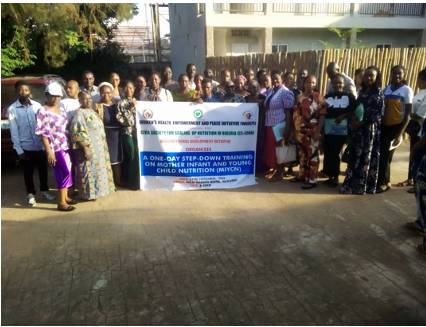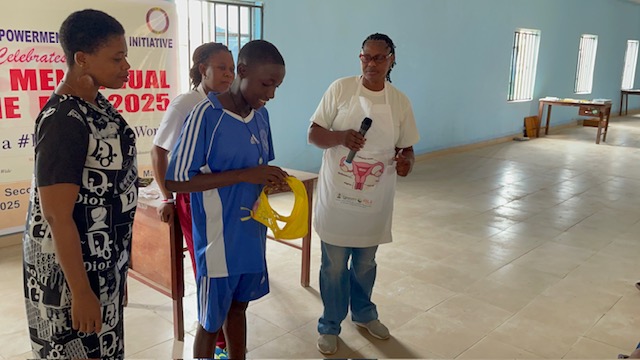One-Day Step-Down Training on Maternal, Infant, and Young Child Nutrition (MIYCN)
- November 30, -0001
- |
- by Admin

Women’s Health, Empowerment, and Peace Initiative (WOHEPI), in collaboration with the Civil Society Scaling Up Nutrition in Nigeria (CS-SUNN), organized a one-day step-down training on Maternal, Infant, and Young Child Nutrition (MIYCN) on the 27th September, 2024. Held at the Palm Garden in Makurdi, Benue State, the training brought together 55 participants representing various NGOs and health sectors. The event aimed to promote best practices in nutrition during the critical "first 1,000 days" of life, which spans from conception to a child’s second birthday. This period is essential for ensuring optimal growth, brain development, and overall health.
The training began with opening remarks from Esther Shimenenge Kyaagba, Executive Director of WOHEPI, who highlighted the importance of scaling up nutrition efforts in the state. She encouraged participants to take the sessions seriously, emphasizing their roles as representatives of their organizations and as future bearers of the MIYCN message. The sessions covered various aspects of maternal, infant, and young child nutrition, addressing critical issues like breastfeeding, complementary feeding, social behavior change communication (SBCC), and the role of NGOs in promoting community nutrition.
The first session, facilitated by Esther Shimenenge Kyaagba, provided an overview of MIYCN. Participants learned about the significance of proper nutrition during pregnancy, infancy, and early childhood. Exclusive breastfeeding for the first six months of life and timely introduction of complementary foods were highlighted as essential practices to prevent malnutrition and promote healthy development. The session also underscored the challenges of undernutrition and overnutrition, both of which pose significant health risks to mothers and children.
Prof. Priscilla Utoo led the second session on adolescent and maternal nutrition. She described adolescence as a critical period of growth and development, emphasizing the increased nutritional needs during this stage. Poor nutrition in adolescent girls, she noted, often leads to long-term consequences, including anemia, stunted growth, and complications during pregnancy. Strategies to address these issues, such as community sensitization and the Essential Nutrition Actions (ENA) approach, were also discussed. Prof. Utoo highlighted key indicators from the 2018 National Demographic Health Survey, which revealed alarming rates of malnutrition and maternal mortality in Nigeria.
Subsequent sessions delved deeper into specific MIYCN practices. Facilitators Rachel Ityonzughul and Ann Tor explored the benefits of breastfeeding for both mothers and infants. Participants were educated on the advantages of exclusive breastfeeding, including its role in strengthening the baby’s immune system and fostering mother-child bonding. They also discussed the risks of artificial feeding, such as increased susceptibility to infections and chronic diseases. This session emphasized that breastfeeding should begin within the first hour after birth and continue alongside complementary feeding until the child is at least two years old.
Complementary feeding was the focus of another session, facilitated by Mrs. Regina Ejale. Participants learned about the importance of introducing nutrient-rich, safe, and diverse foods to children at six months of age. Mrs. Ejale highlighted the World Health Organization’s recommendation that children consume at least five of eight identified food groups daily to meet their nutritional needs. The session also addressed the consequences of improper complementary feeding, which can result in malnutrition and developmental delays.
The role of Social Behavior Change Communication (SBCC) in promoting MIYCN practices was addressed by Mr. Sunday Akaa. SBCC was presented as a vital strategy for influencing community behavior and fostering sustainable health practices. Participants were introduced to the five stages of behavior change, ranging from awareness to sustained adoption of new behaviors. Mr. Akaa emphasized the importance of engaging community leaders and influencers to ensure the effective dissemination of MIYCN messages. He also highlighted the role of safe water, sanitation, and hygiene (WASH) in supporting optimal nutrition and preventing diseases like diarrhea and pneumonia.
The training concluded with a discussion on the role of NGOs in community nutrition, led by WOHEPI leadership. NGOs were recognized as key players in raising awareness, mobilizing resources, and advocating for policies that enhance food security and access to healthcare services. The session highlighted the need for continued collaboration between organizations to address malnutrition and its associated challenges effectively.
In her closing remarks, Esther Shimenenge Kyaagba expressed gratitude to the facilitators and participants for their active involvement. She urged them to utilize the knowledge gained from the training to drive positive changes in their communities. Mrs. Kyaagba emphasized that improving maternal, infant, and young child nutrition is fundamental to breaking the cycle of poverty and malnutrition, thereby contributing to global health and development goals.
This training underscored the importance of MIYCN practices in promoting the health and well-being of mothers and children. By focusing on education, behavior change, and community engagement, the initiative demonstrated a commitment to fostering healthier futures and addressing critical nutritional challenges. The collaboration between WOHEPI and CS-SUNN exemplifies the power of partnerships in advancing health and development strategies worldwide.
Search
Recent Projects
REPORT ON THE CELEBRATION OF...
June 15, 2025
